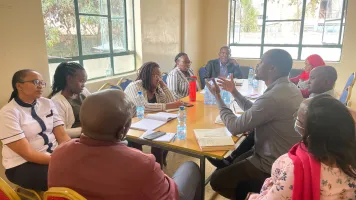How can countries make the most of technology and data to build stronger health systems and create better health outcomes?
To explore this, the Global Partnership and D-tree facilitated a peer exchange between the governments of Kenya and Zanzibar. Both governments have digitally transformed their health systems in recent years and are prioritizing health data governance.
While many governments are leveraging technology and data to improve their health systems and deliver better healthcare outcomes, numerous challenges often prevent the data generated by digital health programs from being used effectively. The regulatory frameworks and data governance practices necessary to facilitate the effective, safe, and fair use of health data are often non-existent. Moreover, few opportunities exist for governments to increase their knowledge about data governance, especially on a practical level.
This country-level exchange allowed both governments to compare and share their experiences relating to their different regulatory environments and ongoing projects. It also helped lay the foundation for ongoing collaboration and discussion around how to make the best use of health data.
How did it work?
The exchange took place in Kenya over two days in June 2023, including participation from senior level Ministry of Health officials and technical staff. Discussions spanned legislation, data security, privacy, interoperability, and comparisons of the digital health priorities, strategies, and infrastructure of each country. The discussion was complemented by a visit to Kitengela Sub-County Hospital, the first health facility in Kenya to adopt the Afya KE platform and fully digitize all its health services.
The speed and coordination exhibited by the Ministry of Health Kenya were impressive. The visit provided valuable insights and highlighted the importance of infrastructure and political will.
– Mr. Khamis Bilal Ali, Health Coordinator, Pemba, Ministry of Health Zanzibar
Key insights
By the end of the exchange, participants had gained valuable insights for advancing health data governance and data initiatives. Key lessons include:
- The crucial roles played by national and institutional infrastructure, frameworks, and regulations in driving and guiding digitization processes;
- The importance of government funding and political will in driving change;
- And the significance of accountability and participation in data management.
Collaboration with external organizations and international agencies was identified as crucial for supporting successful implementation. Furthermore, data quality and management were highlighted as essential for effective healthcare outcomes, and empowering patients in data sharing was emphasized to enhance engagement. Sustainable government leadership and investment were deemed vital for long-term impact.
What’s next?
The exchange also set the stage for ongoing discussions and collaborations among the participants. Besides topics directly related to data governance, several items of high mutual interest, related to the broader theme of digital health, surfaced. As a result, participants proposed the creation of a community of practice to facilitate regular knowledge sharing between governments in East Africa. This, together with a reciprocal visit where a Kenyan delegation can observe the progress of the Zanzibar government in taking ownership of various digital health programs, is being developed.
We hope that creating these spaces for governments to share their experiences and lessons with each other, and discuss the issues that are most relevant to them, will accelerate the progress of government-led digital health and data governance initiatives in East Africa.
The exchange allowed us to gain valuable insights into Zanzibar's progress in infrastructure development and change management. We were inspired by their achievements and motivated to accelerate our own efforts.
– Dr. Joyce Wamicwe, Head of Policy and Research, Kenya Ministry of Health
A detailed report of the peer exchange is available here.
D-tree would like to thank the Patrick J. McGovern Foundation for supporting this work.


